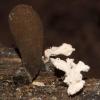
07-02-2026 20:30
 Robin Isaksson
Robin Isaksson
Hi!Anyone that have this one and can sen it to me?

25-01-2026 23:23
Hello! I found this species that resembles Delitsc

05-02-2026 15:07
Found on a fallen needle of Pinus halepensis, diam

05-02-2026 06:43
Stefan BlaserHello everybody, Any help on this one would be mu

18-08-2025 15:07
 Lothar Krieglsteiner
Lothar Krieglsteiner
.. 20.7.25, in subarctic habital. The liverwort i

02-02-2026 21:46
Margot en Geert VullingsOn a barkless poplar branch, we found hairy discs

02-02-2026 14:55
 Andgelo Mombert
Andgelo Mombert
Bonjour,Sur thalle de Lobaria pulmonaria.Conidiome

02-02-2026 14:33
 Andgelo Mombert
Andgelo Mombert
Bonjour,Sur le thalle de Peltigera praetextata, ne
Xylocoremium flabelliforme and Xylaria cubensis
John Plischke,
25-06-2012 08:49
 Today I found Xylocoremium flabelliforme comfirmed microscopically, I have seen it several times before but always by itself. Today I found it with a Xylaria. Looking at the Xylaria under the microscope all I could find was a single spore 6 X 3.5 um. It looked just like a Xylaria spore but it did not have a germ slit. I am not certain where it came from. Looked for over an hour and I could not find any other spores. I do not want to make a false assumption on the single spore because I do not know where it came from since that is all I found. By doing a little reading it leads me to believe it may be Xylaria cubensis. There were a number of Xylaria longipes about 100 feet away. I have found X. longipes many times before but I never found X. cubensis. Does anyone know if there is a way to macroscopically tell them apart? From checking herbarim records it appears that Xylaria cubensis has not been collected in Pennsylvania before and I am very intrested in this. Thank you,
Today I found Xylocoremium flabelliforme comfirmed microscopically, I have seen it several times before but always by itself. Today I found it with a Xylaria. Looking at the Xylaria under the microscope all I could find was a single spore 6 X 3.5 um. It looked just like a Xylaria spore but it did not have a germ slit. I am not certain where it came from. Looked for over an hour and I could not find any other spores. I do not want to make a false assumption on the single spore because I do not know where it came from since that is all I found. By doing a little reading it leads me to believe it may be Xylaria cubensis. There were a number of Xylaria longipes about 100 feet away. I have found X. longipes many times before but I never found X. cubensis. Does anyone know if there is a way to macroscopically tell them apart? From checking herbarim records it appears that Xylaria cubensis has not been collected in Pennsylvania before and I am very intrested in this. Thank you,John
Thomas Læssøe,
26-06-2012 14:05
Re : Xylocoremium flabelliforme and Xylaria cubensis
even a mature X. cubensis will have brownish tinges on the surface and no real squamulose stuff unlike the grey to black, ± squamulose (and much bigger) X. longipes. Your thing looks like X. cubensis but the spore must be alien else you would fine many. A young X. longipes will be grey powdered from conidia - there is no conidial production on the surface of a cubensis stroma.
cheerss
cheerss
John Plischke,
27-06-2012 06:54

Re : Xylocoremium flabelliforme and Xylaria cubensis
Thank you Thomas
John
John
Jacques Fournier,
29-06-2012 21:04

Re : Xylocoremium flabelliforme and Xylaria cubensis
Hi John,
I have already seen one stroma of typical X. cubensis collected by Marc Stadler in Germany.
The associated anamorph leaves little doubt about the identity of the fungus. Xylaria cubensis, unlike all known European taxa, features a thick carbonaceous crust above the perithecial layer, nearly 200 µm thick, which is easy to evaluate on a split up stroma.
The spores of X. cubensis are dark brown and indeed the germ slit is very difficult to make out, if not absent. Maybe your stroma is hardly mature, check perithecia near the base, they get mature first. You can't base your observations on only one spore, try to find mature asci!
Cheers,
Jacques
I have already seen one stroma of typical X. cubensis collected by Marc Stadler in Germany.
The associated anamorph leaves little doubt about the identity of the fungus. Xylaria cubensis, unlike all known European taxa, features a thick carbonaceous crust above the perithecial layer, nearly 200 µm thick, which is easy to evaluate on a split up stroma.
The spores of X. cubensis are dark brown and indeed the germ slit is very difficult to make out, if not absent. Maybe your stroma is hardly mature, check perithecia near the base, they get mature first. You can't base your observations on only one spore, try to find mature asci!
Cheers,
Jacques
John Plischke,
01-07-2012 09:41

Re : Xylocoremium flabelliforme and Xylaria cubensis
Thank you Jacques
John
John

